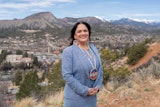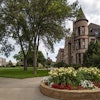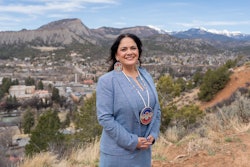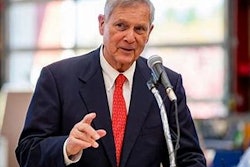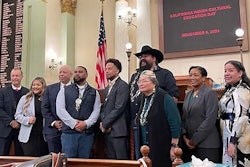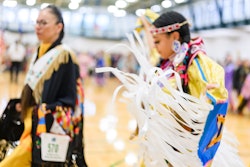Recognizing Tribally Centered Cultures
When Native students transfer to mainstream institutions, the biggest obstaclesto overcome often involve the admissions office.
By Mark Anthony Rolo
MADISON, Wis.
The drive from the Menominee Indian reservation to the University of Wisconsin-Madison may only be three and a half hours, but for American Indian students like Fawn Youngbear-Tibbitts, the journey towards completing a college degree can’t be measured in mere miles.
Youngbear-Tibbitts is one of a growing number of tribal college graduates pursuing a four-year degree. After earning her associate degree from the College of Menominee Nation, Youngbear-Tibbitts — who is a member of the White Earth Band of Ojibwe — set her sights on UW-Madison.
Transferring from a two-year institution to a four-year one can be stressful under the best of circumstances, but for Youngbear-Tibbitts and three other Menominee students, the road to UW came with its share of challenges. Fortunately for Youngbear-Tibbitts, adjusting to a more diverse cultural community was not one of the obstacles. “It’s pretty hard for me to get culture shock,” she says. “I’ve lived in New Zealand and other places. I didn’t have the problems that many Native students experience when they move away from home.”
Youngbear-Tibbitts says she knew going to UW-Madison full time would create more financial hardships for her family. But the single mother of two-year-old twin boys says the most challenging aspect of her transfer was convincing UW that the coursework she completed at Menominee was rigorous enough to prepare her for the four-year institution.
“I knew I was academically prepared.
I know how to write a research paper,” she says. “But I still had to take some courses over.”
Youngbear-Tibbitts chose not to argue with the university over those few base-level science courses, especially since she believes she would never have been accepted at all if it weren’t for a unique transfer agreement between Menominee and UW. In an effort to recruit Menominee students, UW-Madison now recognizes courses based on indigenous knowledge. Youngbear-Tibbitts’ academic focus — sustainable development — was one of the disciplines specifically targeted by UW.
Like all of the nation’s 34 tribal colleges, the College of Menominee Nation promotes broad higher education within the context of a tribal culture. Language, history and ceremony are among the foundations on which the college’s education programs are built.
Menominee’s articulation agreement with UW-Madison has been four years in the making. Though the college has transfer agreements with other UW campuses in the areas of education, nursing and social work, many thought the sustainable development program couldn’t
co-exist with UW-Madison’s natural resources program.
“We had to have a meeting of the minds that was based on respect,” says Dr. Kevin McSweeney, a professor of soil science and director of UW’s arboretum. McSweeney was instrumental in helping negotiate the articulation agreement. He says the idea to explore an agreement between the two institutions first came up four years ago, when he was working with the tribal college on natural resource management issues. But before any agreement could be seriously discussed, McSweeney says Menominee and UW-Madison had to come to terms with some basic cultural differences.
“This relationship required a fair amount of getting to understand each other, developing an appreciation of different worldviews,” he says.
But finding common ground between the institutions wouldn’t be enough, he says. Menominee students would also need help adjusting to a non-reservation environment, especially on a campus of more than 30,000 students.
Youngbear-Tibbitts says the head of the life sciences communication department played a significant role in her transition from the reservation to UW-Madison.
Dr. Jacqueline Hitchon McSweeney, Kevin McSweeney’s wife, helped Youngbear-Tibbitts locate an apartment in Madison and advocated for her to receive course credit for speaking her native language of Ojibwe. Youngbear-Tibbitts, who grew up around Ojibwe speakers and took formal classes, says she was surprised to discover that UW didn’t accept Ojibwe as a valid non-English language. But with Hitchon McSweeney’s help, she managed to convince admissions officials to change their requirement. Instead of sitting down to take a written exam, Youngbear-Tibbitts tested out of her language requirement via a phone conversation with a UW faculty member who spoke Ojibwe.
“It made perfect sense to test over the phone,” she says. “Ojibwe is an oral language.”
There are currently 0 comments on this story.
Click here to post a comment.
© Copyright 2005 by DiverseEducation.com
